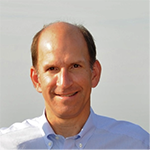
About
Dennis serves as Chief Operating Officer for Theo Chocolate, the first bean-to-bar maker of organic, fair trade, fair for life, and non-GMO-certified chocolate in North America. In his role, Dennis oversees the day-to-day functions of the company, including its supply chain and sourcing strategy. With more than 15 years of experience in ethical sourcing and sustainable agriculture, Dennis helps Theo deliver on its mission to create delicious products while working to improve livelihoods and protect the environment in farm and factory communities alike. His supervision of Theo’s supply chain — from smallholder farmers in the Congo to local logistics partners — ensures strict compliance with trusted third-party certifications such as fair trade through IMO’s Fair for Life program, Non-GMO Verified Project and organic certification by QAI. Before arriving at Theo, Dennis led a private consultancy to clients including the Bill & Melinda Gates Foundation, World Cocoa Foundation and the Eastern Congo Initiative. He spent eight years as Director of Global Responsibility at Starbucks, where he was responsible for coffee and cocoa sourcing practices, CSR reporting, strategic NGO partnerships and sustainable agriculture initiatives. Prior to his career in the consumer packaged goods industry, Dennis worked in similar capacities for startups and international NGOs. Dennis is a member of the Specialty Coffee Association of America sustainability council and was a member of the USDA Consultative Group on Child Labor under Secretary Tom Vilsek. He received his M.B.A. from UC – Berkley after earning a Bachelor of Arts degree from Harvard University. His earliest chocolate memory is of a homemade dark chocolate cake prepared by his mother for his fourth birthday — a tradition he has happily carried on in the years since. How did you first get involved in the green industry? My first professional engagement with environmental work dates back more than 20 years when I worked in Central America as a Peace Corps Volunteer. In the mid-’90s I worked for Conservation International — a group you might know for its public and private sector partnerships as well as its field projects with goals to protect rainforest and ocean biodiversity. In my role, I worked with rainforest communities to establish viable businesses for sustainable products like Tagua Nut buttons and developed markets for them with major manufacturers and retailers who shared their commitment to protecting tropical forests. What interests you most about being green? I think the most interesting topics in sustainability are those that truly get at the intersection of social and environmental responsibility. For example, people increasingly want to learn about where their food comes from and how it is produced. They want to know these things for a variety of complex and interrelated reasons: they want to be sure that their purchasing decisions support fair labor conditions, sure, but it’s also important that producers are protecting ecosystems, respecting wildlife reserves and using only natural and organic ingredients. I’m proud to work for Theo because it’s a company that understands the full breadth of what “being green” can mean. What is your biggest “green” pet peeve? Opportunistic greenwashing. I see a lot of claims about products or practices that go unchallenged. Finally, we are seeing efforts to define “all natural,” and consumers are starting to demand transparency and facts about what is in their product. At the same time, there seems to be a somewhat persistent notion that being “green” is like checking a box to make consumers feel good, but it’s not that simple. Confusion around compostable, biodegradable and recyclable materials allow people to feel good about using more packaging. Compostable packaging made from corn sounds good. But what about the actual life cycle of that product, how much energy or calories were used to produce it? Is it diverting food into waste? Is it made with GMO grains? What is the actual “greenness” of the final product that it’s being used to hold or wrap? It’s important for organizations to understand the full range and depth of their environmental impacts before determining where to focus their efforts. For companies like Theo, it’s not about simply choosing the one or two most visible aspects of our business but considering which issues have the greatest long-term social, environmental and bottom line impacts. What green trend is most exciting to you or your industry? It’s not pervasive yet, but it’s very gratifying to see companies beginning to take stock of their full supply chains, from raw material to retail distribution, and thinking about how their products are used. We’re starting to see a realization that companies can affect change beyond just their own operations — that their influence extends upstream to suppliers and downstream to retail partners and consumers as well. It’s the same “value chain-focused” way of doing business that Theo looks for in our supplier and distributer relationships.Episodes
-
December 31, 2014
Making Great Chocolate with Triple Bottom Line Principles with Theo Chocolate’s Dennis Macray
Theo Chocolate ethically sources the highest-quality cocoa to produce its line of chocolate products.